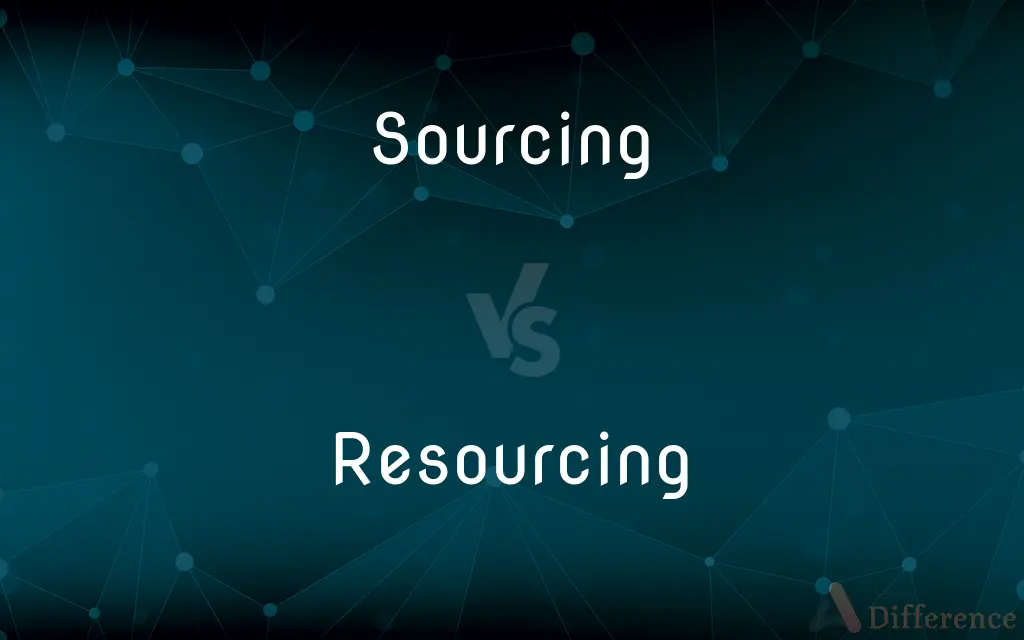Sourcing vs. Resourcing — What's the Difference?
Edited by Tayyaba Rehman — By Fiza Rafique — Updated on March 19, 2024
Sourcing involves finding and acquiring goods or services from external sources, focusing on procurement process. Resourcing, on the other hand, encompasses allocating and managing resources, like time, money, and personnel, for projects or operations.

Difference Between Sourcing and Resourcing
Table of Contents
ADVERTISEMENT
Key Differences
Sourcing primarily deals with the process of identifying, evaluating, and engaging suppliers of goods and services. This can include activities such as supplier research, negotiation, and contracting. Whereas resourcing is concerned with the strategic allocation and utilization of various resources, including human resources, capital, and materials, to meet the objectives of a project or business operation.
In sourcing, the emphasis is on optimizing cost, quality, and supply chain efficiency. Companies often look for the best suppliers who can provide the required goods or services at the lowest cost without compromising on quality. On the other hand, resourcing focuses on ensuring that the right resources are available at the right time and place, and are used effectively and efficiently to achieve project or operational goals.
Sourcing strategies can vary widely depending on the industry, the nature of the goods or services, and the market conditions. Strategies may involve global sourcing, local sourcing, ethical sourcing, and more. Resourcing strategies, however, are centered around resource planning, resource allocation, and resource management, aiming to maximize productivity and minimize waste.
A key aspect of sourcing is managing relationships with suppliers to ensure reliable supply and to foster partnerships that can offer competitive advantages. Resourcing, in contrast, includes managing internal resources or resources from third parties in a way that aligns with the company’s strategic goals and project objectives.
Sourcing and resourcing both require ongoing monitoring and adjustment based on performance metrics and market or project conditions. However, the metrics used in sourcing might focus on supplier performance, cost savings, and procurement efficiency, whereas in resourcing, the focus is on resource utilization rates, project timelines, and budget adherence.
ADVERTISEMENT
Comparison Chart
Definition
Process of finding and acquiring external goods/services
Allocation and management of internal and external resources
Primary Focus
Supplier selection, cost, and quality
Resource efficiency, availability, and optimization
Strategies Involved
Global, local, ethical sourcing, etc.
Resource planning, allocation, and management
Key Activities
Supplier research, negotiation, contracting
Resource allocation, utilization, and management
Metrics for Success
Supplier performance, cost savings, procurement efficiency
Resource utilization, project timeline, budget adherence
Compare with Definitions
Sourcing
Discovering products to meet specific market needs.
Sourcing unique products has allowed our company to stand out in the market.
Resourcing
Distributing materials and supplies where they are needed most.
Efficient resourcing ensures no department is left without necessary supplies.
Sourcing
Evaluating supplier performance and compliance with standards.
Sourcing also involves regular evaluations of supplier reliability.
Resourcing
Allocating human resources effectively across projects.
Resourcing the development team properly has accelerated our project timeline.
Sourcing
Identifying potential suppliers for goods or services.
The company is sourcing new suppliers for its raw materials.
Resourcing
Balancing time resources to meet deadlines and objectives.
Strategic resourcing has been crucial in meeting our quarterly goals.
Sourcing
Reducing costs through strategic supplier selection.
Effective sourcing is key to maintaining our profit margins.
Resourcing
Managing financial resources to maximize investment returns.
Our company focuses on resourcing initiatives that promise high ROI.
Sourcing
Negotiating contracts with suppliers to ensure favorable terms.
Our procurement team excels in sourcing agreements that benefit us in the long term.
Resourcing
Leveraging technology resources to enhance productivity.
By resourcing our teams with the latest technology, we've seen a significant increase in efficiency.
Sourcing
A person or thing from which something comes into being or is derived or obtained
Alternative sources of energy.
The source of funding for the project.
Resourcing
The provision of resources.
Sourcing
The point of origin of a stream or river.
Resourcing
Present participle of resource
Sourcing
One, such as a person or document, that supplies information
Reporters are only as reliable as their sources.
Sourcing
(Physics) The point or part of a system where energy or mass is added to the system.
Sourcing
To specify the origin of (a communication); document
The report is thoroughly sourced.
Sourcing
To obtain (materials or parts) from another business, country, or locale for manufacture
They sourced the spoke nuts from our company.
Sourcing
To outsource or insource (tasks or jobs, for example).
Sourcing
Present participle of source
Sourcing
The process by which something is sourced, or obtained from another place.
Sourcing
The supply of resources needed by a business process.
Common Curiosities
What is the main goal of sourcing?
The main goal of sourcing is to find and acquire the best possible goods or services from external suppliers at the most favorable terms.
Can sourcing involve services, or is it limited to goods?
Sourcing can involve both services and goods, aiming to meet the diverse needs of a business or project.
How does resourcing contribute to project success?
Resourcing contributes to project success by ensuring that all necessary resources (human, financial, material) are efficiently allocated and utilized to meet project objectives.
What is a key difference between sourcing and resourcing strategies?
Sourcing strategies focus on external procurement optimization, while resourcing strategies are concerned with the internal allocation and management of resources.
How do companies measure the effectiveness of their sourcing efforts?
Companies measure the effectiveness of sourcing through metrics such as cost savings, supplier performance, and procurement efficiency.
Can sourcing impact a company’s competitive advantage?
Yes, effective sourcing can provide a competitive advantage by reducing costs, ensuring quality, and securing reliable supply chains.
How do sourcing and resourcing impact a company's bottom line?
Both sourcing and resourcing directly impact a company's bottom line by influencing cost efficiency, operational effectiveness, and project success.
Can small businesses benefit from strategic sourcing and resourcing?
Yes, small businesses can significantly benefit from strategic sourcing and resourcing by optimizing their operations and enhancing competitiveness.
What role does technology play in resourcing?
Technology plays a crucial role in resourcing by providing tools for resource planning, allocation, management, and optimization.
Is ethical sourcing considered a part of standard sourcing practices?
Yes, ethical sourcing, which considers environmental and social impacts, is increasingly becoming a part of standard sourcing practices.
How do businesses manage resource constraints in resourcing?
Businesses manage resource constraints by prioritizing projects, reallocating resources as needed, and sometimes acquiring additional resources.
What is resource planning in the context of resourcing?
Resource planning involves forecasting resource requirements and scheduling their allocation to ensure project needs are met efficiently.
What challenges do companies face in sourcing?
Companies face challenges such as supplier reliability, cost fluctuations, and maintaining quality standards in sourcing.
How important is communication in resourcing?
Communication is crucial in resourcing to ensure clear understanding of resource needs, allocations, and adjustments among all stakeholders.
What is the difference between resourcing for a project vs. operational needs?
Resourcing for a project is often time-bound and goal-specific, whereas operational resourcing focuses on ongoing business activities and efficiency.
Share Your Discovery

Previous Comparison
Surrealism vs. Hyperrealism
Next Comparison
Exude vs. ExtrudeAuthor Spotlight
Written by
Fiza RafiqueFiza Rafique is a skilled content writer at AskDifference.com, where she meticulously refines and enhances written pieces. Drawing from her vast editorial expertise, Fiza ensures clarity, accuracy, and precision in every article. Passionate about language, she continually seeks to elevate the quality of content for readers worldwide.
Edited by
Tayyaba RehmanTayyaba Rehman is a distinguished writer, currently serving as a primary contributor to askdifference.com. As a researcher in semantics and etymology, Tayyaba's passion for the complexity of languages and their distinctions has found a perfect home on the platform. Tayyaba delves into the intricacies of language, distinguishing between commonly confused words and phrases, thereby providing clarity for readers worldwide.














































